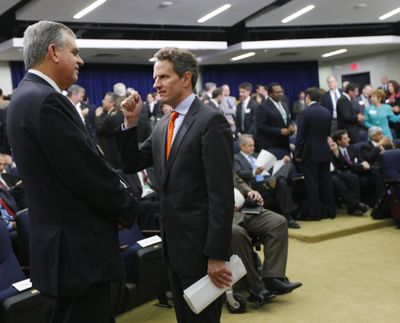Democrats may tap bailout funds for jobs
Initiative targets infrastructure, local governments

WASHINGTON – Democrats are looking to tap as much as $70 billion in unused funds from the Wall Street bailout to pay for new spending on roads and bridges and to save the jobs of firefighters, teachers and other public employees, officials said Thursday.
After talks with administration officials such as Treasury Secretary Timothy Geithner, Democratic lawmakers are eyeing what remains from last year’s $700 billion financial rescue package as a way to finance job-related legislation. Two House Democratic aides said the figure could be as high as $70 billion.
The aides, who required anonymity to describe the private talks, discussed the dollar figure after House Speaker Nancy Pelosi, D-Calif., said money from the bailout should be used to pay for jobs legislation that would funnel billions of dollars to road, bridge and other infrastructure projects and help struggling state and local governments retain public employees.
She also promised help for small businesses reeling from a credit crunch.
Pelosi didn’t give a price tag on the initiative and said it would come on top of a costly “safety net” initiative that would again extend unemployment payments for those whose benefits have run out and renew a program that offers the jobless a 65 percent subsidy for health insurance premiums under the COBRA program.
Pelosi’s remarks to reporters came as the White House held a jobs forum of business and labor leaders to explore ideas on how to boost slumping employment figures.
Most of what Pelosi described were ideas included in February’s $787 billion economic recovery bill. Even the most ardent supporters of that measure wish it were doing more to help employment.
“We want to build upon what has been successful for us,” Pelosi said.
One new idea Democrats and the White House are looking at is a program to give people cash incentives to retrofit their homes with energy-saving materials.
About $210 billion of Troubled Assets Relief Program money remains uncommitted or has been paid back; Bank of America Corp. also announced Wednesday that it would repay its $45 billion in government bailout money.
The administration has been wary of using TARP funds for other purposes, but Pelosi’s comments come after administration officials have privately softened that stance in discussions with congressional Democrats.
“The investment that we have in jobs ought to be paid for in TARP funds,” Pelosi said.
Using bailout authority for a jobs initiative would add billions to the $12.1 trillion national debt. Under the law, repaid TARP funds must be used to reduce the debt and any TARP money that isn’t needed simply is never borrowed. Democrats want to use the authority to borrow about another $70 billion to pay for the jobs program.
Geithner has until the end of the month to decide whether to renew the program. While he’s given no indication he won’t renew TARP, he says he wants to wind it down.
But on Thursday he signaled that the program could be extended and made a point of highlighting the TARP repayments. He said estimated losses from the program would be substantially lower than first thought.
“What that means is we’re going to be able to use substantial resources, very, very substantial resources to meet not just the immediate challenges facing the country in terms of creating job growth, sparking private investment, but to meet our long-term fiscal challenges,” he said on CNBC.
Pelosi said she hopes the jobs package could pass by the end of the year, though she acknowledged the short congressional schedule may mean it’ll have to wait until early next year. Congressional Democrats, however, are hopeful of extending unemployment benefits and COBRA subsidies in an upcoming omnibus spending bill.